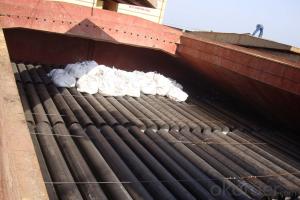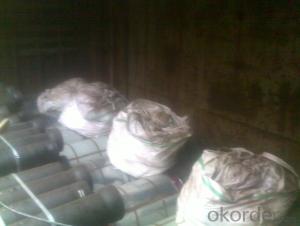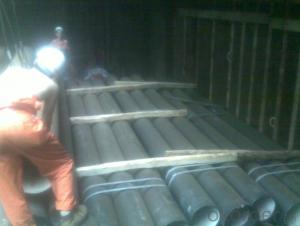K Type Ductile Iron Pipe DN200
- Loading Port:
- China Main Port
- Payment Terms:
- TT or LC
- Min Order Qty:
- 23 m.t.
- Supply Capability:
- -
OKorder Service Pledge
OKorder Financial Service
You Might Also Like
1) The standard of pipe: ISO2531:1998, EN545:2006,K9 K8
2) Effective length: 6m/5.7m
3) Inner cement line: Portland cement lineas per ISO4179
4) Zinc coating: at least 130g/m2 as per ISO8179
5) Bitumen painting: at least 70μm as per ISO8179
6)With 102% quantity of NBR, SBR, or EPDM ring asper ISO4633
7) DN80-DN1200
8) Highstrength, lighter than grey iron, good corrosion resistance, no furring, smallflow resistance, easy fixing, long life tome about 100 yeas
9)Checked by automatic inspection equipment
10) Composition:
Chemical composition | |||
Chemical composition | Ductile Cast Iron Pipe (%) | Grey iron pipe (%) | Steel pipe (%) |
C | 3.5-4.0 | 3.2-3.8 | 0.1-0.2 |
Si | 1.9-2.6 | 1.4-2.2 | 0.15-0.4 |
Mn | 0.15-0.45 | 0.4-0.6 | 0.3-0.6 |
P | ≤0.06 | ≤0.3 | 0.02-0.03 |
S | ≤0.02 | ≤0.1 | 0.02-0.03 |
Mg | 0.03-0.06 |
|
|
11) Feature:
Mechanical properties | |||
| Ductile Cast Iron Pipe | Grey Iron Pipe | Steel Pipe |
Tensile Strength(Mpa) | ≥420 | 150-260 | ≥400 |
Yield Strength(Mpa) | ≥300 | No Confirmation | No Confirmation |
Bending Strength(Mpa) | ≥590 | 200-360 | ≥400 |
Elongation (%) | ≥10 | Neglected | ≥18 |
Brinell Hardness(HBS) | ≤230 | ≤230 | About 140 |
12) T type mechanical joint
13) Packing: in bulk or container
- Q:Are ductile iron pipes available for cutting and are there any relevant specifications?
- Can be cut, the specification is based on the original specification, just for some engineering needs
- Q:Are ductile iron pipes suitable for tunneling projects?
- Ductile iron pipes are well-suited for tunneling projects due to their strength, durability, and flexibility. With their ability to endure high pressure and heavy loads, they are an excellent choice for underground tunnels. These pipes are also highly resistant to corrosion, which is vital in moist and chemical-laden underground environments. Furthermore, their installation and maintenance are relatively simple, making them a cost-effective option for tunneling endeavors. In summary, ductile iron pipes possess the essential characteristics needed for tunneling projects, making them a fitting selection for these applications.
- Q:What are the different coating thickness options for ductile iron pipe?
- The coating thickness options for ductile iron pipe can vary depending on the specific application and requirements. Generally, there are three common coating thickness options for ductile iron pipe: 1. Standard Thickness: The standard coating thickness for ductile iron pipe is usually between 200 and 250 microns (8-10 mils). This thickness provides adequate protection against corrosion and abrasion in most soil and water environments. 2. Increased Thickness: In some cases, where the pipe is exposed to more aggressive environments or requires a longer service life, an increased coating thickness may be necessary. This can range from 300 to 500 microns (12-20 mils) or even more, depending on the specific requirements. 3. Specialized Coatings: For particularly demanding applications, specialized coatings may be used. These coatings can provide even higher levels of protection against corrosion, abrasion, or chemical exposure. The thickness of these specialized coatings can vary significantly depending on the specific coating material and application requirements. It is important to note that the selection of coating thickness should be based on a thorough assessment of the environmental conditions, intended service life, and any applicable industry standards or specifications. Consulting with a coating manufacturer or a corrosion specialist is recommended to determine the appropriate coating thickness for a specific ductile iron pipe application.
- Q:Can ductile iron pipes be made into clear tubes?
- Of course, the cast iron pipe is suitable for being buried in the ground because of its corrosion resistance, rust resistance and non deformation.
- Q:Are ductile iron pipes resistant to seismic events?
- Yes, ductile iron pipes are generally resistant to seismic events. Ductile iron is a type of cast iron that is known for its high strength and durability. It has the ability to withstand significant external forces, including those caused by seismic events such as earthquakes. Ductile iron pipes are designed to be flexible and can absorb and dissipate the energy generated by seismic waves. This flexibility allows the pipes to withstand ground movements and vibrations without breaking or cracking. Additionally, the joints of ductile iron pipes are designed to provide some degree of flexibility, which further enhances their resilience against seismic events. Moreover, ductile iron pipes are constructed with thick walls, providing them with a high level of structural integrity. This strength makes them less susceptible to damage during seismic events and helps maintain the flow of water and other fluids even under extreme conditions. However, it is important to note that the resistance of ductile iron pipes to seismic events can also depend on various factors such as the magnitude and proximity of the earthquake, the quality of installation and maintenance, and the specific design considerations for the pipeline system. Therefore, it is crucial to ensure that proper engineering and construction practices are followed to maximize the resilience of ductile iron pipes in seismic-prone areas.
- Q:How to control mortar proportioning in ductile iron pipe cement coating
- The mix ratio of cement coated mortar for ductile iron pipes refers to the weight ratio of various raw materials consisting of ductile iron pipes and cement coated mortars.
- Q:Do ductile iron pipes require additional protection against external factors?
- It is necessary to provide extra protection for ductile iron pipes due to external factors. Despite being strong and durable, ductile iron pipes are susceptible to corrosion and other threats that can cause pipe failure. The primary external factor that ductile iron pipes require protection from is corrosion. Corrosion can weaken the pipe over time and is caused by certain chemicals present in soil or water. To prevent corrosion, ductile iron pipes are often coated with substances like polyethylene or zinc. This coating acts as a barrier, safeguarding the pipe against corrosive elements and prolonging its lifespan. In addition to corrosion, ductile iron pipes may also need protection against physical damage. These pipes are typically buried underground, making them vulnerable to forces like heavy machinery, ground movement, and vandalism. To protect against physical damage, ductile iron pipes can be encased in concrete or surrounded by a protective sleeve or casing. Furthermore, ductile iron pipes may require protection against soil conditions that can lead to pipe movement or shifting. In areas with unstable soil, it may be necessary to implement measures such as proper bedding and backfilling techniques, as well as the use of anchoring devices. These measures ensure the stability and integrity of the pipes. To conclude, although ductile iron pipes are strong, they still need additional protection against external factors. This includes preventing corrosion, protecting against physical damage, and addressing soil conditions. By implementing these protective measures, the lifespan and performance of ductile iron pipes can be significantly extended, ensuring the reliable transportation of water and other fluids.
- Q:How does ductile iron pipe handle soil movements and settlements?
- Ductile iron pipe has gained a reputation for effectively managing soil movements and settlements. Its ability to accommodate ground shifts and settling without compromising its structural integrity is attributed to its flexibility and durability. A notable characteristic of ductile iron pipe lies in its inherent strength and resilience. It can endure external pressures and stress caused by soil movements, including lateral forces and ground settlement. This is due to its high tensile strength, which enables it to resist deformation and maintain its shape even under substantial loads. Furthermore, the flexibility of ductile iron pipe plays a crucial role in its capacity to handle soil movements. The pipe's natural flexibility allows it to absorb the impacts of ground shifts and movements without fracturing or breaking. It can bend and adjust to changes in the surrounding soil, minimizing the risk of pipe failure or leakage. Additionally, the joint design of ductile iron pipe contributes to its effectiveness in managing soil movements and settlements. The installation employs a push-on joint system that permits some movement and settlement without compromising the overall integrity of the pipeline. The joints can absorb and distribute stress and movement, minimizing the risk of pipe failure. In conclusion, ductile iron pipe excels in managing soil movements and settlements. Its strength, flexibility, and joint design enable it to withstand external pressures resulting from ground shifts, settling, and other soil movements. As a result, ductile iron pipe is a reliable choice for a range of applications where soil movement is a concern.
- Q:What are the different corrosion protection options for ductile iron pipe?
- There are several corrosion protection options available for ductile iron pipe to ensure its longevity and durability. These options include: 1. Cement Mortar Lining: This involves coating the inner surface of the pipe with a layer of cement mortar, which acts as a barrier between the pipe and corrosive elements in the water or soil. Cement mortar lining provides excellent corrosion resistance and can last for several decades. 2. Polyethylene Encasement: This method involves wrapping the ductile iron pipe with a layer of polyethylene material. The polyethylene acts as a physical barrier, protecting the pipe from external corrosive elements. Polyethylene encasement is commonly used in aggressive soil conditions and can offer long-lasting protection. 3. Internal and External Coatings: Various types of coatings can be applied to the inner and outer surfaces of the ductile iron pipe to provide corrosion resistance. These coatings can be epoxy, polyurethane, or fusion-bonded epoxy (FBE) coatings. These coatings create a barrier between the pipe and the surrounding environment, preventing corrosion. 4. Cathodic Protection: This method involves using an electrical current to protect the pipe from corrosion. Cathodic protection systems can be either galvanic (sacrificial anode) or impressed current systems. These systems direct the flow of electrons to prevent the oxidation of the ductile iron pipe. 5. Zinc Coating: Zinc coating, also known as galvanizing, involves applying a layer of zinc to the surface of the ductile iron pipe. The zinc acts as a sacrificial anode, corroding instead of the iron pipe. Zinc coating provides effective corrosion protection, particularly in soil conditions with low resistivity. It's important to note that the choice of corrosion protection option for ductile iron pipes depends on various factors such as the environment, water chemistry, soil conditions, and expected service life. Consulting with corrosion protection specialists and engineers can help in selecting the most suitable option for specific applications.
- Q:Can ductile iron pipe be used for wastewater treatment plant sludge dewatering?
- Yes, ductile iron pipe can be used for wastewater treatment plant sludge dewatering. Ductile iron pipes are commonly used in wastewater treatment plants due to their durability, strength, and corrosion resistance. They can handle the harsh conditions and abrasive nature of sludge dewatering processes. Ductile iron pipes are also known for their leak-proof joints, which are crucial in preventing any leakage of sludge during the dewatering process. Additionally, ductile iron pipes are available in various sizes and can be easily installed, making them a suitable choice for wastewater treatment plant sludge dewatering applications.
1. Manufacturer Overview |
|
|---|---|
| Location | |
| Year Established | |
| Annual Output Value | |
| Main Markets | |
| Company Certifications | |
2. Manufacturer Certificates |
|
|---|---|
| a) Certification Name | |
| Range | |
| Reference | |
| Validity Period | |
3. Manufacturer Capability |
|
|---|---|
| a)Trade Capacity | |
| Nearest Port | |
| Export Percentage | |
| No.of Employees in Trade Department | |
| Language Spoken: | |
| b)Factory Information | |
| Factory Size: | |
| No. of Production Lines | |
| Contract Manufacturing | |
| Product Price Range | |
Send your message to us
K Type Ductile Iron Pipe DN200
- Loading Port:
- China Main Port
- Payment Terms:
- TT or LC
- Min Order Qty:
- 23 m.t.
- Supply Capability:
- -
OKorder Service Pledge
OKorder Financial Service
Similar products
New products
Hot products
Related keywords




























